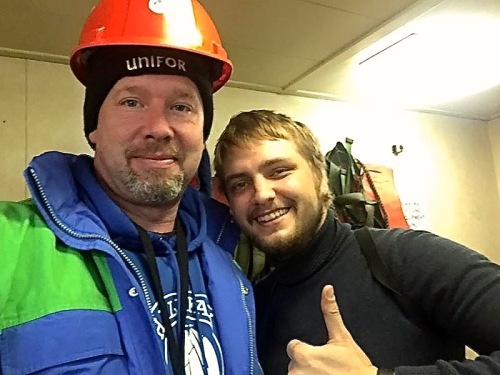 For immediate release — because we’re out the door to a loud, rowdy, hands-off-our-jobs rally! More to follow.
For immediate release — because we’re out the door to a loud, rowdy, hands-off-our-jobs rally! More to follow.
Vancouver—Transport workers will march through downtown Vancouver Thursday morning to demand Ottawa abandon plans to gut transportation regulations, hand Canadian jobs to vulnerable foreign workers, and sell off public airports and seaports to foreign corporate interests.
RALLY THURSDAY FEBRUARY 23
WHERE: 701 West Georgia Street, Vancouver (Federal Court of Canada)
WHEN: 10:00 am
Global trade-union legend Paddy Crumlin, president of the London-based International Transport Workers Federation, will address the rally. The protest will be led by Unifor, the International Longshore and Warehouse Union Canada, and the Seafarers International Union of Canada. Also participating are the BC Ferry and Marine Workers Union, the Canadian Merchant Service Guild and the International Union of Operating Engineers.
Crumlin, long known for his loud, rowdy role as national secretary of the Maritime Union of Australia, is expected to highlight the growing global fightback by transport workers under assault by transnational corporations.
Unifor and the International Longshore and Warehouse Union Canada represent workers in air, rail, ports, trucking, marine, and ferry services. They are calling on the federal government to protect the more than 900,000 Canadian jobs threatened by the action plan laid out by David Emerson in his recent report on the Canadian Transportation Agency.
Stephen Harper’s Conservative government commissioned the plan for dismantling the Canadian transportation system. Justin Trudeau’s Liberals have actively embraced its recommendations, spending heavily for consultants to report on pushing Emerson’s recommendations forward.
“Canada’s airports belong to Canadians. Selling them off to corporations will only result in higher costs for passengers,” says Gavin McGarrigle, Unifor’s BC Area Director. “If Justin Trudeau doesn’t abandon this flawed report now, he will simply be advancing Stephen Harper’s privatization legacy.”
Rob Ashton, president of International Longshore and Warehouse Union Canada, says: “This rally is to protest changes that would deregulate Canada’s maritime sector and allow foreign workers to take as many as 12,000 jobs now done by Canadian seafarers. Ottawa also wants to sell off Port of Vancouver operations piecemeal to foreign offshore corporations.
“We are telling the Liberal government to leave Canadians on deck—don’t deregulate our safe seas and sell off our national port and airport infrastructure,” says Ashton. “Foreign corporations with no stake in Canada could put our economy and environment at risk with no benefit to the nation.”
Crumlin adds: “It’s a disgrace really, that a widely respected democratic and wonderful country like Canada—which has stood for values of properly regulated national employment and decent work for its workers, responsible corporate behaviour and civil and human rights—is prepared to simply throw away that reputation.
“It makes no sense to toss out your ability to govern your domestic transportation infrastructure in the national interest, or to hand it to offshore foreign corporations whose sole preoccupation is labor exploitation, minimum security standards and tax avoidance as their competitive edge.”
Unifor is Canada’s largest union in the private sector, representing more than 310,000 workers.
The International Longshore Workers’ Union Canada (ILWU) is comprised of over 6,000 members at 12 autonomous locals and three affiliates: Retail Wholesale Union-BC, Retail Wholesale Department Store Union-Saskatchewan, and the Grain Services Union.
The Seafarers International Union of Canada (SIU) represents the majority of unlicensed sailors working aboard vessels on the Great Lakes, the St. Lawrence River, on the East Coast and the West Coast.
The International Transport Workers’ Federation (ITF) is an international federation of nearly 700 unions, representing more than 4.5 million transport workers from 150 countries.
Gavin McGarrigle, BC Area Director Unifor at 778-668-6455. www.unifor.org
Rob Ashton, President of ILWU Canada at 604-862-8141. www.ilwu.ca
Diane Given, SIU at (905) 227-5213. www.seafarers.ca
Peter Lahay, ITF National Coordinator Canada at 604-418-0345. www.itfcanada.org


